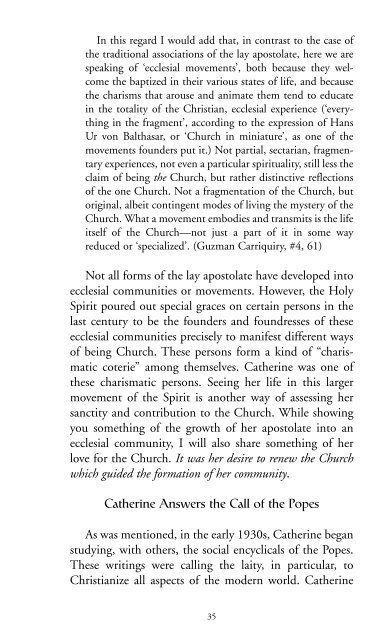Robert_Wild_-_Catherine_Doherty_Servant_of_God
Robert_Wild_-_Catherine_Doherty_Servant_of_God
Robert_Wild_-_Catherine_Doherty_Servant_of_God
Create successful ePaper yourself
Turn your PDF publications into a flip-book with our unique Google optimized e-Paper software.
In this regard I would add that, in contrast to the case <strong>of</strong><br />
the traditional associations <strong>of</strong> the lay apostolate, here we are<br />
speaking <strong>of</strong> ‘ecclesial movements’, both because they welcome<br />
the baptized in their various states <strong>of</strong> life, and because<br />
the charisms that arouse and animate them tend to educate<br />
in the totality <strong>of</strong> the Christian, ecclesial experience (‘everything<br />
in the fragment’, according to the expression <strong>of</strong> Hans<br />
Ur von Balthasar, or ‘Church in miniature’, as one <strong>of</strong> the<br />
movements founders put it.) Not partial, sectarian, fragmentary<br />
experiences, not even a particular spirituality, still less the<br />
claim <strong>of</strong> being the Church, but rather distinctive reflections<br />
<strong>of</strong> the one Church. Not a fragmentation <strong>of</strong> the Church, but<br />
original, albeit contingent modes <strong>of</strong> living the mystery <strong>of</strong> the<br />
Church. What a movement embodies and transmits is the life<br />
itself <strong>of</strong> the Church—not just a part <strong>of</strong> it in some way<br />
reduced or ‘specialized’. (Guzman Carriquiry, #4, 61)<br />
Not all forms <strong>of</strong> the lay apostolate have developed into<br />
ecclesial communities or movements. However, the Holy<br />
Spirit poured out special graces on certain persons in the<br />
last century to be the founders and foundresses <strong>of</strong> these<br />
ecclesial communities precisely to manifest different ways<br />
<strong>of</strong> being Church. These persons form a kind <strong>of</strong> “charismatic<br />
coterie” among themselves. <strong>Catherine</strong> was one <strong>of</strong><br />
these charismatic persons. Seeing her life in this larger<br />
movement <strong>of</strong> the Spirit is another way <strong>of</strong> assessing her<br />
sanctity and contribution to the Church. While showing<br />
you something <strong>of</strong> the growth <strong>of</strong> her apostolate into an<br />
ecclesial community, I will also share something <strong>of</strong> her<br />
love for the Church. It was her desire to renew the Church<br />
which guided the formation <strong>of</strong> her community.<br />
<strong>Catherine</strong> Answers the Call <strong>of</strong> the Popes<br />
As was mentioned, in the early 1930s, <strong>Catherine</strong> began<br />
studying, with others, the social encyclicals <strong>of</strong> the Popes.<br />
These writings were calling the laity, in particular, to<br />
Christianize all aspects <strong>of</strong> the modern world. <strong>Catherine</strong><br />
35


